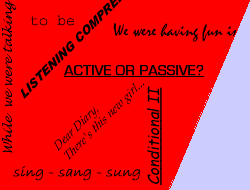
TENSES
In this review of all important grammatical tenses , you will find brief explanations about the use of the different tenses, how to form them, and short examples for each tense.
For more information about all English tenses or a complete overview, please download the printable PDF documents listed at the bottom of this page.
Overview - Irregular Verbs - Forms of "to be"
Past Perfect Tenses - Past Tenses - Present Perfect Tenses - Present Tenses - Future Tenses
General introduction:
The present tense is used to refer to actions that are happening now (at present) or to describe general facts or habits that are always the same.
Unlike present tenses in many other languages, the English present tenses can usually NOT be used to refer to the future! Find out more about future tenses HERE!
Present simple & present progressive
1st verb form
(he, she, it --> 3rd person 's')
a) simple general statements & facts
(something that is true/false)b) habits
(something somebody always/often/never does)c) descriptions of things (state descriptions)
- The sun rises in the east.- We always take the bus to school.
- The car is yellow with blue stripes.
TYPICAL TIME INDICATORS:
always, never, often, seldom(ly), rarely, sometimes, usually, as a rule, regularly, every day/weekend, every now and then, normally, generally, frequently, ...
am / is / are + 'ing'-form
a) actions that are happening right now
b) temporary situations, exceptions from regular situations
c) developments and actions in progress
d) descriptions of what is happening (descriptions of procedure)
e) complaints, expressions of anger and annoyance
- Listen, she is crying!- He is working in a bar although usually he works as a teacher.
- You can feel that spring is here; the temperatures are getting warmer every day.
- What are they doing? - He is pointing a gun at her and she is screaming.
- The bus is always coming late.
TYPICAL TIME INDICATORS:
now, at the moment, currently, presently, at present, in this moment; Listen! Look! Watch out!
Intensive Grammar Course - Tenses [in German!]
Intensive Grammar Course - key to exercises [in German!]
In this Intensive Grammar Course you will find extensive explanations for all English Tenses. It discusses the use of different tense forms as well as the grammatical forms of all the tenses. Furthermore you can check if you have understood everything in short exercises after each chapter.
short overview of all tenses (except future tenses) [in German!]
short overview of all future tenses [in German!]
These two grammar charts give you a quick overview on all tenses. They are in PDF format, so you can print them out and pin them onto your wall. They can really help you get familiar with the English tenses, so I strongly recommend you download them and have a look!
Please visit the following sites for more on English tenses:
The English Page offers numerous resources for learners of English as a Second Language (ESL).
On this site (www.englishpage.de.vu or englishpage.iris-solutions.org) learners can find all the Grammar Rules and explanations in English, German and Spanish, as well as a great variety of exercises to train and test their Grammar skills: All English tenses (Present Tense Simple, Present Tense Progressive, Past Tense Simple, Past Tense Progressive, Present Perfect Tenses, Past Perfect Tenses, Future Tenses - will & going to future, Mixed tenses); Active or Passive, Indirect Speech (= Reported Speech), Conditionals (if-sentences), Relative Clauses and Contact Clauses, Adjective or Adverb, some - any and other determiners, Gerund or Infinitive, rules for Questions and Negation, Modal Verbs (can, may, must, shall, might...) and of course Irregular Verbs, as well as linking words and other grammar topics are all included in the Grammar section! Start learning English TODAY! Test your knowledge of ESL on downloadable grammar exercise sheets in PDF format and revise the rules!

